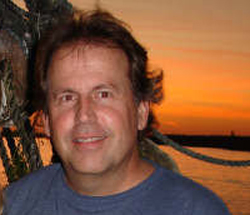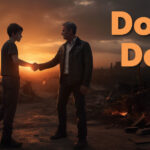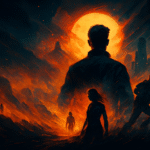Recently John Robert Marlow interviewed Terry Rossio for his web site: The Lonely Keyboard.
TERRY ROSSIO is the second-highest grossing screenwriter in the history of the medium. He prefers to write with a partner, which is almost invariably Ted Elliott. Together, they’ve written the screenplay and/or story for films such as Aladdin, Godzilla, The Mask of Zorro, The Legend of Zorro, Shrek, Pirates of the Caribbean: The Curse of the Black Pearl, Pirates of the Caribbean: Dead Man’s Chest, Pirates of the Caribbean: At World’s End, National Treasure: Book of Secrets, and G-Force. Terry also co-wrote (with Bill Marsilii) the record-breaking Deja Vu spec script—which sold for $5.6 million. (Read Terry’s official bio here.)
I’ve excerpted just a small sampling of the highlights below, so please do yourself a favor and read the full text.
It is honest, eye-opening and simply the most insightful screenwriter interview you’re likely to read all year. Thanks to S.M. for the tip!
On being on “the inside” of Hollywood:
I know writers want to think it’s all about access, and it’s true that for me, at this point, I can get a screenplay read, far easier than most. But that doesn’t mean much if it doesn’t sell, and no writer is so inside that anything they write sells. Lawrence Kasdan has three unsold specs. Shane Black has films he wants to get made he can’t get made. When every studio passes on your project, let me tell you, that feeling of being on the inside disappears fast.
On the amount of money the top screenwriters make:
They want to keep alive the fiction that the top end of financial reward for screenwriters is up there with the actors, directors, and producers. But there is a brutal glass ceiling for screenwriters. If Keira Knightly gets $15 million and a piece of the gross for just one film, that’s more than I’ve been paid in my entire 18 year career, every project combined.
On what makes him (and his writing partners) different from other screenwriters:
A couple things jump out. We’ve never turned in a draft where we felt it couldn’t go into production the next day. There is such a thin membrane between done and worth doing. It takes a certain insanity to achieve the needed level of denial and believe what you’re doing is worth the pain, because most drafts get rejected, most drafts get misread, and every draft gets changed. But we never became jaded, we always managed to tell ourselves this is the one, this is the one they’ll want to make, as-is.
The other thing that comes to mind is we’ve never cared so much for dark, bleak, and cynical. Though the entire town here seems to think that’s what audiences want. And so dark, bleak and cynical screenplays get attention, and dark, bleak and cynical films get made. Fine. That leaves the top of the box office to us, and Steven Spielberg, and James Cameron, and David Koepp.
On what he first considers when sitting down to write:
Well, okay. Starting from the beginning … the first issue to me, and most important, is whether the concept of the movie is intrinsically compelling. I like to feel with absolute certainty that the fundamental idea for the film is, without a doubt, an exceptional premise, one that implies that a film must be made from it, without question. You want to cross the finish line at the beginning of the race.
On character relationships and backstory:
I shouldn’t go too far without starting to think about the main character relationship or relationships in the film. (Note, not the main character, or characters, their histories and such. That’s not so important. To me, the relationship between characters is what needs to be defined, those are the moments audiences want to watch, and the actual characters can be adjusted to make the main relationship or relationships the most interesting). That leads to thinking about what kind of character, and character situation, is best to mine the concept, or take best advantage of the concept or story arena.
On identifying the end of the story:
Early in the process I want to focus on the ending. Nothing else matters, nothing will happen, no project will be begun or get anywhere or make any progress at all until the ending is known. If there is no satisfying ending, or at least the glimmer of one, then the idea will sit on the shelf. Good endings are hard. But once you have it, then everything else derives from the ending, because it’s all, in a sense, setting up that final twist, or emotion, or feeling, or thematic statement, or rush of excitement, or chill, or brilliant payoff, or sublime wisdom, or whatever.
On what’s lacking in today’s scripts:
I will also add that many screenplays out there seem woefully deficient regarding character patterns. That issue makes up the largest category of screenplays that demand rewrites. Great stories examine evolving and interesting character relationships; the character interaction patterns are as important, or more so, than the plot patterns. Too many writers, I think, don’t even consider their stories from this point of view—too bad, because more than anything else, that’s the part of the work that will be judged, by the studios, producers, actors, directors … and the audience.
Please read the full interview at The Lonely Keyboard.
And if for some reason you don’t already have the site bookmarked, please check out Terry Rossio and Ted Elliott’s brilliant screenwriting columns at Wordplayer.com.
A couple things jump out. We’ve never turned in a draft where we felt it couldn’t go into production the next day. There is such a thin membrane between done and worth doing. It takes a certain insanity to achieve the needed level of denial and believe what you’re doing is worth the pain, because most drafts get rejected, most drafts get misread, and every draft gets changed. But we never became jaded, we always managed to tell ourselves this is the one, this is the one they’ll want to make, as-is.
The other thing that comes to mind is we’ve never cared so much for dark, bleak, and cynical. Though the entire town here seems to think that’s what audiences want. And so dark, bleak and cynical screenplays get attention, and dark, bleak and cynical films get made. Fine. That leaves the top of the box office to us, and Steven Spielberg, and James Cameron, and David Koepp.







Man, he’s right about endings. Good endings are HARD! They give me fits.
I’m going to go read the rest of the interview. Yay, another blog for me! I just cleaned out my list — I am down to 60 blogs I read regularly.
Er, 61. *cough*
61 blogs! And I thought I was pushing it with 40! They can be an amazing source of knowledge and inspiration… and also an incredible time sink.